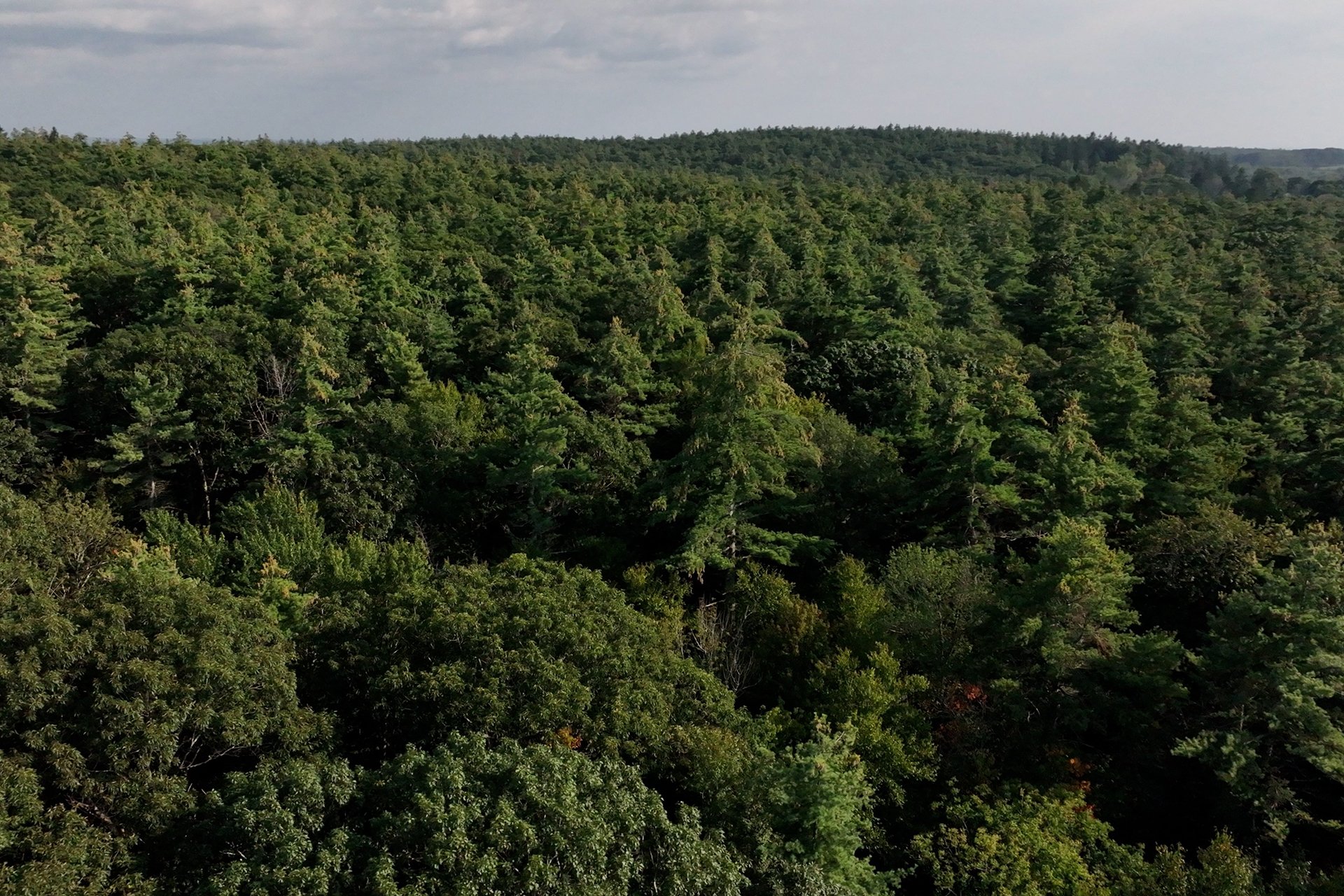Saving 1,350 Acres of Forest in Winchendon and Ashburnham: A Roadmap to Success
April 01, 2024
In December, elected officials in two small towns faced a huge decision: allow a developer to build a solar project that would require cutting down 350 acres of trees, or find a way to save the forest so it could be enjoyed by residents for all time?
What happened next became a land conservation victory that provides a case study for how we can meet our monumental climate goals.
What Is 30x30?
In 2021, a presidential executive order called for the conservation of at least 30 percent of U.S. lands, freshwater, and ocean areas by 2030. The initiative, commonly referred to as 30x30, addresses the climate change and biodiversity crises by protecting more natural areas while increasing access to nature for communities that lack it.
Here in the Commonwealth, the state’s Clean Energy and Climate Plan calls for a 50 percent statewide reduction of greenhouse gas emissions by 2030. We cannot meet that goal if we don’t protect our forests, where trees capture and store carbon.
A Choice to Make
Enter the towns of Winchendon and Ashburnham in northern Worcester County. Winchendon, nicknamed “Toy Town” for the Converse Company that manufactured children’s toys there until the 1930s, would be the first to grapple with this challenge. In December, its 11,000 residents faced a critical decision about the future of 1,300 acres of forest.
A developer planned to purchase the land to build a utility-scale solar facility, which would involve clearing 350 acres of high-value habitat. The town had a right of first refusal and could either match the $6 million purchase price, assign the option to a conservation group, or let the solar development proceed. But the town didn’t have $6 million to spare.
In order to communicate that there was still a way to save the forest, we joined forces with Mount Grace Land Conservation Trust to convince townspeople and elected officials in the two towns to assign their purchase option to Mass Audubon.
However, an outcome of that magnitude doesn’t happen without being able to deliver in several key areas.
First of all, Mass Audubon was in a unique position to come to the table quickly with $6 million, courtesy of major gifts from generous supporters. These gifts are the foundation of a new fund that will accelerate the pace of land protection across Massachusetts to reach those 30x30 goals.
Even with funds in hand, we still had to convince the towns that while solar and other sources of clean energy are needed to fight climate change, solar projects must be located strategically to avoid sacrificing vital forests and farmlands that also play an active role in mitigating climate change. We also knew that the towns would receive significant tax revenue from a huge new solar facility.
Residents Have Their Say
That evening in December at the Winchendon Select Board meeting, there was a standing-room-only crowd. Residents packed the room, and the solar developers and the conservation advocates from Mass Audubon and Mount Grace both had a chance to present their case. Then it was the residents’ turn, and as one after the other spoke, it became clear that the conservation message that we and the Mount Grace staff had conveyed had resonated with the people of Winchendon.
Each spoke about the cultural, historical, and recreational importance of preserving the forest. They spoke thoughtfully about the need for solar, pointing out that 130 acres in town are already devoted to solar installations, but also recognized that a holistic climate solution must include protecting large, unfragmented forests.
While acknowledging the importance of tax revenue for the town, they shared why they felt it was even more critical to protect that land for climate, biodiversity, and the enjoyment of future generations. They cited the significance of this land as a crucial corridor that connects with 1,500 adjacent protected acres, as well as the role of this forest in protecting water quality, biodiversity, and the climate.
By the end of the night, the Select Board was convinced, and voted unanimously to preserve the 1,300 acres of woodland in perpetuity. A few nights later, Ashburnham followed suit. It is Mass Audubon’s intent to eventually convey this land to MassWildlife, which will manage it to maintain and enhance its conservation values and public accessibility.
A Roadmap for Success
Accomplishments like this only happen when an organization has deep support from generous donors, strong relationships with key town and land trust partners, and a reputation as a proven leader. Mass Audubon and our partners had all the necessary resources ready, which enabled us to step in and assist with a once-in-a-generation opportunity to protect more than 1,350 acres of forest.
This land conservation victory in Winchendon and Ashburnham comes in addition to others—for instance, our new Pawtucket Farm Wildlife Sanctuary, a former Christmas tree farm in Lowell that would otherwise have been developed. This rare opportunity to protect 20 acres in a dense urban setting, part of our Nature in the City initiative, helps fight climate change and gives residents in lower-income communities needed access to the outdoors and the ability to connect with nature.
While different in many ways, these are both examples of Mass Audubon’s work with towns and conservation partners to protect natural spaces for people and wildlife across the state. A new $75 million land conservation fund will enable us to protect even more of these spaces and do our part to meet these critical climate goals.
As President David O’Neill said, “What a night. What a victory. What an honor to see democracy in action.”
And we’re just getting started.
Stay Connected
Don't miss a beat on all the ways you can get outdoors, celebrate nature, and get involved.



